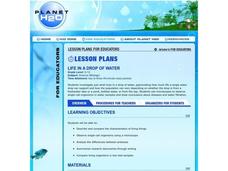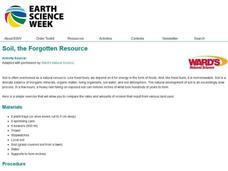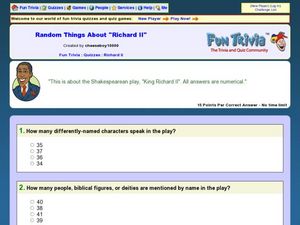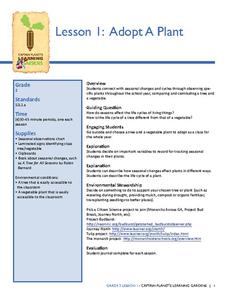Curated OER
Nouns
In this identifying nouns in sentences worksheet, students underline the nouns and label them as persons, places, or things. Students write 30 answers.
Curated OER
The Important Thing About Reading
Third through fifth graders discover the importance of reading and plan a service project to provide books to children. First, they read the book The Important Book and then they brainstorm about the importance of reading. Afterward,...
Soft Schools
Similes and Metaphors
Do your kids a little more practice identifying similes and metaphors? This activity can be used as extra practice, for homework, or as part of a group activity
Overcoming Obstacles
Having a Positive Attitude
Through discussion and reflection, scholars discover what it means to have a positive attitude, that an individual can choose to stay positive, and discuss the benefits of a positive attitude. Learners listen to negative scenarios to...
Curated OER
Breaking Things
In this ESL worksheet, students look at 12 pictures of broken items and engage in a conversation about each discussing what is wrong, what is broken, and how it happened.
Curated OER
Food Chain/Food Web
Students explore ecosystems. In this ecology lesson, students read an article explaining ecosystems. Students create a visual organizer with index cards using components of various ecosystems.
Curated OER
What's Wild
Third graders discover the differences between wild and domestic animals. In this animal lesson, 3rd graders chart the differences in the animals and look through magazines for pictures of wild and domestic animals to glue to a poster....
Curated OER
What Do Plants Need?
Learners experiment with plants. In this plant lesson, students research the needs of plants. Learners determine if all plants have the same requirements for growth. In small groups, students experiment with different plants.
Curated OER
Life in a Drop of Water
High schoolers examine the structure, function, and characteristics of microscopic organisms that inhabit freshwater through collection of water samples and observation through microscopes.
Curated OER
Cell-to-Cell
Ninth graders use online tutorials, class discussion, presentations and scientific articles to explore types of cells along with cell structure, function and behavior. They explore ethical questions related to cells and disease.
Curated OER
Soil, the Forgotten Resource
Students discuss soil understanding that is is often overlooked as a natural resource. In this science lesson, students recognize that we depend on it for energy in the form of foods. Students experiment with six boxes of soil to help in...
Curated OER
Trying New Things
Puppets are like magical objects for young learners! Often, a child will feel more comfortable "talking to" a puppet than to an adult. Here, youngsters make puppets and use them to act out stories about having new experiences. As a final...
Curated OER
Things in Groups Puzzles
In this grouping puzzles worksheet, 7th graders solve and complete 8 different problems that include grouping in various puzzles. First, they read the clues given in each box to solve the puzzle. Then, students create their own puzzle...
Curated OER
Proper Nouns: Person, Place, or Thing
Learners recognize proper nouns in sentences and print them on the lines. They write twelve short answers.
Curated OER
Finding Things That Are the Same
In this classifying worksheet, students examine 5 rows of animal clip art pictures. They circle the two animals in each row that are the same.
Curated OER
The Shape of Things
In this tangram worksheet, students are provided with 7 geometric shapes. Students cut out the shapes to arrange them into a variety of different pictures and objects.
Curated OER
Seeing Things From the Someone Else's Point of View
High schoolers attempt to see the world from someone else's perspective. In this Peace Corps lesson, students read "Sharing in Africa." The piece challenges readers to consider how show respect for the cultural values of others while not...
Curated OER
Random Things About Richard II
The title is correct: this quiz contains random questions dealing with the numbers of items or speeches in the play Richard II. A different way to check detailed reading comprehension.
Curated OER
Things That are Pink
Pretty in pink! Share the color pink and build word recognition skills with your special-needs or autistic students. This resource includes nine different items to recognize, their corresponding words, and five questions which prompt...
Curated OER
Things That are Orange
What can you think of that is orange? Bring this word recognition activity to your special education class. Learners can view this resource as many times as necessary to learn about items that are the color orange. They can also build...
Curated OER
The Differences Between Turtles and Tortoises
First graders differentiate between turtles and tortoises. In this turtles and tortoises lesson students are visited by a turtle and a tortoise. Students write a letter with an illustration after the animals visit the class.
Curated OER
Things I Saw On Halloween
In this mini book worksheet, students read a story about things they saw on Halloween and make a mini book. Story is very simple and focuses on repeated phrases.
Odyssey of the Mind
Odyssey of the Mind Curriculum Activity: Extend-sive Thinking
Can knowing about things of the past help predict the types of things seen in the future? Advanced learners consider the idea that things extend. In other words, concrete things like bridges and intangible things like ideas extend from...
Captain Planet Foundation
Adopt-A-Plant
Note the way that plants change during the season by adopting a plant on your school campus. After your class chooses their plant, they research the plant's needs, how it differs from other plants, find ways to support their plant's...
Other popular searches
- Where the Wild Things Are
- Living and Non Living Things
- Living Things
- Things Fall Apart
- Living and Non Living Things
- Classify Living Things
- Living Organisms
- Grouping Living Things
- Favorite Things Survey
- How Things Work
- Basic Needs of Living Things
- The Things They Carried

























